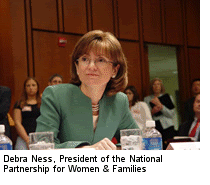
Joined by 22 other members of the Democratic caucus, Senator Ted Kennedy (D-MA) has introduced legislation that will provide some degree of paid sick leave for all Americans and force employers to allow workers to take a minimal amount of time off to care for themselves or a sick child.
"As members of Congress, we don't lose our pay or risk our jobs if we stay home because of illness. But millions of our fellow citizens are not so fortunate," said Kennedy, in introducing the legislation late last week. "Every parent knows what it's like to care for a sick child, and every child knows the importance of a parent taking care of them when they are ill. Yet, every day, countless Americans find their paychecks or even their jobs at risk when illness strikes."
The
Healthy Families Act (
S.910) will provide all American workers who work an average of at least 20 hours per week or 1,000 hours per year, up to seven paid sick days that can be used for "an absence resulting from a physical or mental illness, injury, or medical condition of the employee."
The legislation, which is being introduced in the House of Representatives by Congresswoman Rosa DeLauro (D-CT), also permits the use of the sick days for caring for a child, parent, spouse and -- get ready for anti-gay howling from the Religious Right on this one -- "any other individual related by blood or affinity whose close association with the employee is the equivalent of a family relationship."

"This debate is really about what we value in this nation. If we want strong families and a strong economy, if we care about the health, well-being and economic security of our families, we will waste no time in passing the Healthy Families Act," said Debra Ness, President of the
National Partnership for Women & Families. "Guaranteeing access to paid sick days is the next step in the effort to put our desperately outdated workplaces back in sync with the realities of families. Paid sick days are the next minimum labor standard the nation needs."
The Kennedy bill, which applies to companies with 15 or more employees, is a logical follow-up to the minimum wage increase that was passed by the Democratic Congress in their first two months of controlling the agenda on Capitol Hill.
And despite the fact that almost half of all U.S. workers have no paid sick leave -- with 76 percent of the lowest-income workers having no ability to stay home sick without losing income -- Senate Republicans are already signaling that they're willing to fight this at least as strongly as they boycotted raising the minimum wage.
"To extend this type of leave requirement to businesses, as is contemplated by the Healthy Families Act, would be little more than an unfunded mandate on small businesses throughout the country," said Mike Enzi (R-WY), the ranking Republican on the Senate Health, Education, Labor and Pensions Committee, in hearings last month. "In addition, this legislation represents only direct labor cost, and does not account for a myriad of other indirect costs."
This proves once again, as we have seen so often, that the GOP considers the checkbooks of business first, second and third before giving even a shred of thought to the plight of some working Americans who must work while ill or forfeit pay or maybe even lose their jobs.
And Kennedy pointed out on the Senate floor last week that, with gender roles still being what they are in our society, the primary responsibility for family caretaking often falls on women, making this bill even more important for them.
"This lack of protection is especially difficult for working women with children. Women have moved into the workforce in record numbers, but they continue to have primary responsibility for their children's health," said Kennedy. "Nearly 80 percent of mothers say they are solely responsible for their children's medical care. Yet they can't take a day off to care for a sick child."
"If we truly care about families, we have to change those facts. Americans want to be responsible employees and responsible parents. We need workplace laws that allow workers the time needed to care for themselves or family members when they are sick without losing pay or risking their jobs."
The Massachusetts Senator also emphasized the public-health aspects of his legislation, especially with the large number of workers in the food-service industry who do not have access to paid sick leave and often work while ill to avoid loss of family income.
"Every day, we hear reports of stomach illnesses breaking out in restaurants or on cruise ships. We learn of flu outbreaks leading to hospitalization of the elderly. Such illnesses are contagious, but their spread can be minimized if sick people stay at home," said Kennedy.
And Ness, of the National Partnership for Women & Families, pointed out that, like the minimum wage legislation finally passed after a decade stuck at $5.15 per hour, this bill is a referendum on our national values.
"Chances are each of us will get sick this year, but not all of us will be able to take time off from work to get better," she said. "Millions of workers with no paid sick days are forced each year to work when they are sick, or send sick children to school or leave them home alone. Thats not compassionate, its not family-friendly, and its not acceptable.
You can read more from Bob at
BobGeiger.com.